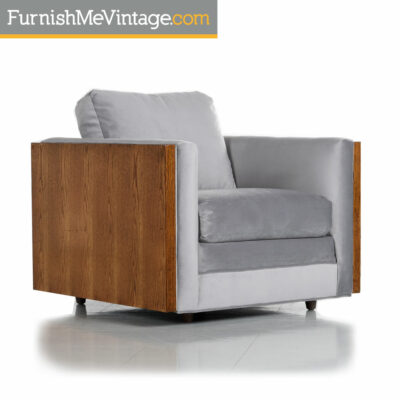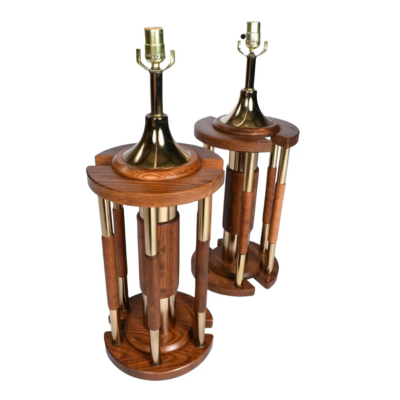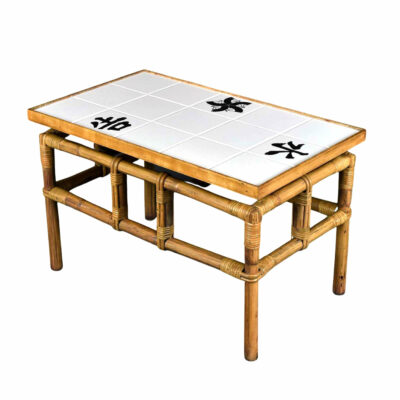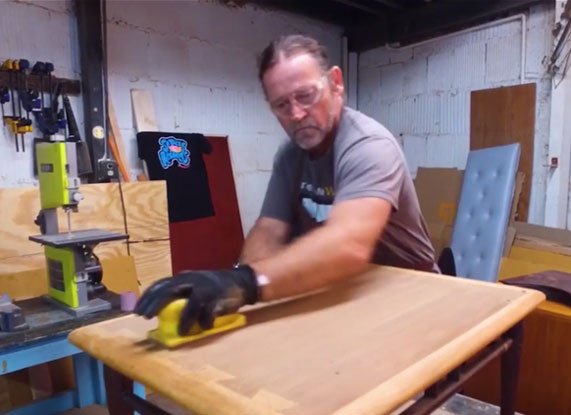Description
Wanna be a bond villain in real life? Well here’s your chance. Certain pieces just command respect and deserve appreciation for their flawless design. “WTF?” is typically the first thing uttered when people see this on our showroom floor. A literal jaw-dropper, regardless of whether installing as a dining table, desk or conference table. Lovingly restored by our in-house cabinet shop, this cocobolo wood table by Don S. Shoemaker is a rare find. Geometry and brutalism intertwine to form an architectural masterpiece of function and form. Staved slats of offset cocobolo form a brilliant patchwork that covers every visible inch of both the top and bottom sections. The grain and color tones vary in each slat to create a stunning visual contrast throughout.
This listing is for the table alone. The chairs pictured are NOT included and are no longer available.
The pedestal and top separate easily without any screws or bolts. The table top has a grid-work of rails underneath that sink into corresponding notches on the base. The base is brilliantly assembled with a hollow interior to keep the weight to a minimum. This massive construction is surprisingly totable, without compromising rigidity or stability.
Although we’re uncertain on the production quantity, the total number is probably quite minuscule. Tagged with its original label and numbered #6 in several locations.
About the designer:
Furniture designer Don Shoemaker was born in Nebraska to an affluent family. During the 1930s, he studied at the Art Institute of Chicago. In the late 1940s, he married and subsequently, on his honeymoon, fell in love with Mexico. He loved the country so much that later in the 1940s, he moved to Mexico with his wife. Shoemaker lived and painted in a town called Santa Maria de Guido, overseeing the City of Morelia in Michoacán.
Don and his wife Barbara lived in harmony with nature, growing many rare plants in their greenhouse. Don became inspired by the tropical woods of Mexico and began to manufacture furniture from these precious timbers. What began as a small factory in the late 1950s became known as Señal S.A and grew to where Don employed more than a hundred skilled artisans. Soon he became an important figure in the economic and cultural life of his adopted town. Señal S.A brought new wealth and an economic boost to the town, and Dom was known for his warm and charitable heart.
The furniture designed for Señal S.A by Don were modern interpretations of traditional Mexican furnishings. Many of his iconic designs were inspired by traditional Mexican woodwork. The pieces made from Cocobolo, a Mexican rosewood, and other precious woods were highly sought after. The furniture was exported to showrooms in Chicago, Los Angeles, Houston, and large Mexican cities. His designs were liked very much by wealthy Mexican families who had complete sets decorating their homes.
His most well-known designs include the Sling Sloucher chair, Sling Swinger chair, the Suspension stool, and his Coffee tables, which were also very popular. Don Shoemaker’s furniture, chairs, tables, and decorative objects remain popular worldwide.
Don passed away in 1990 and handed the business over to his son George, George however, died in the early 2000s, and the company disappeared.






















